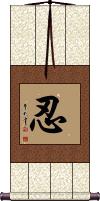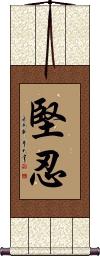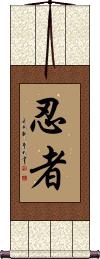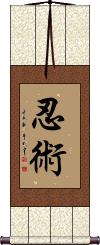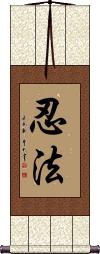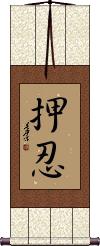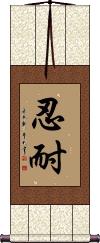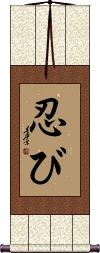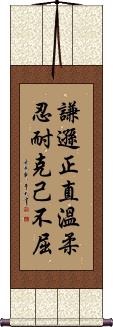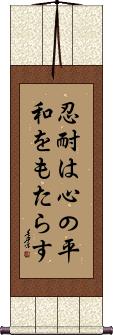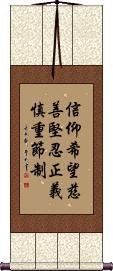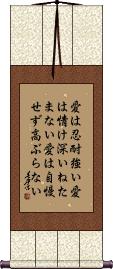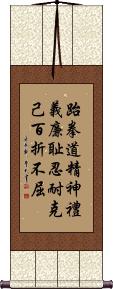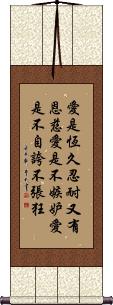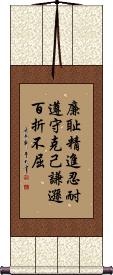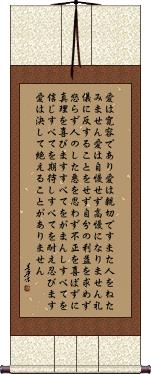Many custom options...
And formats...

忍 in Chinese / Japanese...
Buy an 忍 calligraphy wall scroll here!
Personalize your custom “忍” project by clicking the button next to your favorite “忍” title below...
1. Ninja
4. Ninja
6. Ninpo
8. Patience / Perseverance / To Endure / Tolerant
10. Zhen Shan Ren
11. Patience Yields Peace of Mind
12. Shinobi No Mono
14. Osu No Seishin
15. Perseverance / Indomitable / Invincible Fortitude
17. Patience Brings Peace of Mind
19. Corinthians 13:4
20. Taekwondo Tenets / Spirit of Taekwon-do
21. Corinthians 13:4
Ninja
忍 is just the first character of “Ninja.”
It means to beat, to endure, or to tolerate.
Some use this as the short form of “Ninja” but it would be more correct to use the two-character version in most cases (and for clarity). Other definitions of this Kanji include: to bear, put up with, conceal, spy, or sneak. It is also a character in Korean Hanja and Chinese but not well-known with this meaning but rather a definition like “patience.”![]() Note that when writing this as Kanji, Japanese will tend to write it in the form shown to the right. If you select our Japanese master calligrapher, please expect this Kanji form (yes, it's just one stroke that is slightly different in location, crossing another stroke in the Japanese Kanji form).
Note that when writing this as Kanji, Japanese will tend to write it in the form shown to the right. If you select our Japanese master calligrapher, please expect this Kanji form (yes, it's just one stroke that is slightly different in location, crossing another stroke in the Japanese Kanji form).
Patience / Perseverance
忍 contains the ideas of patience, equanimity, perseverance, forbearance, and endurance. Alone, this single character can be a bit ambiguous or flexible. It can also mean to endure, to bear, to put up with, or to conceal. If you want to simply decide what this character means to you within the general meaning but keep it a mystery to others, this is a good choice.
If you want to be more direct, you may want to choose one of our other selections that mean perseverance or patience (you will see this character within those larger words/phrases).
There is a secondary meaning in Japanese since this is the first character of the word ninja.![]() Note that when writing this as Kanji, Japanese will tend to write it in the form shown to the right. If you select our Japanese master calligrapher, please expect this Kanji form (yes, it's just one stroke that is slightly different in location, crossing another stroke in the Japanese Kanji form).
Note that when writing this as Kanji, Japanese will tend to write it in the form shown to the right. If you select our Japanese master calligrapher, please expect this Kanji form (yes, it's just one stroke that is slightly different in location, crossing another stroke in the Japanese Kanji form).
Perseverance / Fortitude
堅忍 means persistent, steadfast, fortitude, and/or perseverance.
The first character means strong, solid, firm, unyielding, or resolute.
The second character means to beat, endure, or tolerate.
Together they speak of the strength from within yourself. Some may also translate this as long-suffering in a more Biblical sense.
堅忍 is a common term in Chinese and Korean Hanja but a little less commonly used in modern Japanese Kanji. For that reason, this selection is best if your audience is Chinese or Korean.
![]()
 Note that when writing this as Kanji, Japanese will tend to write the second Kanji a little differently. If you select our Japanese master calligrapher, please expect the form where the little horizontal stroke crosses the vertical stroke. See differences in the images to the right. Technically, they are both the same character, and will be read the same in either language.
Note that when writing this as Kanji, Japanese will tend to write the second Kanji a little differently. If you select our Japanese master calligrapher, please expect the form where the little horizontal stroke crosses the vertical stroke. See differences in the images to the right. Technically, they are both the same character, and will be read the same in either language.
Ninja
In feudal Japan, ninjas or shinobi (literally, “one who is concealed” or “one that endures”) were sometimes assassins and agents of espionage. The ninja, like samurai, followed their special code of conduct.
The role of the ninja has been romanticized in many American movies (and to a lesser extent in Japanese movies). Because the ninja craze has taken off in the west, Japan has followed the trend, and you'll see plenty of ninja-related imagery in Japan.![]() Note that when writing this as Kanji, Japanese tend to write the first character in the form shown to the right. If you select a Japanese calligrapher, please expect that form. Our Chinese calligraphers can also write it in Japanese form, but only if you request it (in the special instructions about your order during checkout).
Note that when writing this as Kanji, Japanese tend to write the first character in the form shown to the right. If you select a Japanese calligrapher, please expect that form. Our Chinese calligraphers can also write it in Japanese form, but only if you request it (in the special instructions about your order during checkout).
Ninjutsu / Ninjitsu
忍術 is the “art of the ninja” in Japanese. Most Japanese people associate ninjas with romance and reverence for Japan's ancient past. But most will accept that the ninja is an idea or way of life whose time has passed. However, this has not stopped floods of movies about ninjas and dojos offering Ninjutsu training from keeping the idea of the ninja alive in modern times.
My modern Japanese dictionary defines this as “assassination, stealth, and combat techniques” or “fighting art of the ninja.”
![]() Note that when writing this as Kanji, Japanese tend to write the first character in the form shown to the right. Because this is specifically a Japanese title, we only suggest a Japanese calligrapher for this selection - and you will get the form shown to the right if you do that (please ignore the fact that some of the images you see during the following pages in the options process will be the Chinese/alternate form).
Note that when writing this as Kanji, Japanese tend to write the first character in the form shown to the right. Because this is specifically a Japanese title, we only suggest a Japanese calligrapher for this selection - and you will get the form shown to the right if you do that (please ignore the fact that some of the images you see during the following pages in the options process will be the Chinese/alternate form).
Ninpo
忍法 is Ninpo which can be translated as “Ninja Arts” from Japanese.
If you want this to mean “Ninja Arts,” you should consider this to be Japanese only. In Chinese, someone might read this as “patience law” or “the art of patience.”
The first character can be associated with “Ninja” since it is the “Nin” of “Ninja.” But the literal meaning is patience or perseverance. The second character means “law” or “method.” Often this is extended to mean or be translated as “arts.”
Within a Buddhist context (especially Chinese Buddhism), this is the method or stage of patience, the sixth of the seven stages of the Hīnayāna in the attainment of arhatship, or sainthood.
Osu / Affirmative
Patience / Perseverance / To Endure / Tolerant
忍耐 is patience, the quiet hope, and trust that things will turn out right.
You wait without complaining. You are tolerant and accepting of difficulties and mistakes. You picture the end in the beginning and persevere to meet your goals.
忍耐 can also mean “to endure,” “restrain oneself,” or “forbearance,” and in some contexts, it can mean “perseverance” or “endurance.”
忍耐 is also used as a tenet of Taekwondo, Tang Soo Do, and other Korean martial arts where it's titled “Endurance” and romanized as “In Neh.”
![]() Note that when writing this as Kanji, Japanese will tend to write the first character in the form shown to the right. If you select our Japanese master calligrapher, please expect this Kanji form (yes,
it’s
just one stroke that is slightly different in location, crossing another stroke in the Japanese Kanji form).
Note that when writing this as Kanji, Japanese will tend to write the first character in the form shown to the right. If you select our Japanese master calligrapher, please expect this Kanji form (yes,
it’s
just one stroke that is slightly different in location, crossing another stroke in the Japanese Kanji form).
Shinobi / Ninja Outcast
忍び (Shinobi) is a term often associated with ninjas of ancient Japan.
忍び really means stealing (into), a spy, a sneaking thief, stealth, or a surreptitious visit to a house of ill repute. However, 忍び is sometimes used to refer to an outcast ninja.
This term was somehow given a better report when various video games, TV series, and even a movie came out with this Shinobi title.
忍び are sometimes Romanized as two words: Shin obi or Shin-obi.
Note: The first character can be written as  or
or ![]() .
.
Zhen Shan Ren
Truth Compassion Tolerance
Patience Yields Peace of Mind
Shinobi No Mono
Bujinkan Ninjitsu
Osu No Seishin
押忍の精神 is the name Osu No Seishin or “Spirit of Osu” in Japanese.
This Spirit of Osu is an essential concept in Karate. You will hear “Osu!” shouted in every Karate dojo which is not just a sign of respect and obedience to the Sensei but also means patience, determination, and perseverance. Shouting “Osu!” serves as a reminder to embody these qualities.
Perseverance / Indomitable / Invincible Fortitude
堅忍不抜 means determined, steadfast, unswerving, or unshakable in Japanese.
This is the Japanese version of an old Chinese 4-character perseverance proverb.
This would be understood in Chinese, but it's not commonly written this way in Chinese.
![]() Note that when writing this as Kanji, Japanese calligraphers sometimes write the second Kanji in the form shown to the right. Yes,
it’s
just one stroke that is slightly different in location, crossing another stroke in this alternate Japanese Kanji form. If you have a preference, let us know when you order.
Note that when writing this as Kanji, Japanese calligraphers sometimes write the second Kanji in the form shown to the right. Yes,
it’s
just one stroke that is slightly different in location, crossing another stroke in this alternate Japanese Kanji form. If you have a preference, let us know when you order.
Due to some odd computer coding conventions, these two character forms were combined/merged into the same code point - thus, you will not see Kanji images of more Japanese form as you select options for your scroll.
Korean CKD Virtues
谦逊正直温柔忍耐克己不屈 are the virtues used by Choi Kwang Do Martial Arts.
| English | Hanja | Hangul | Pronunciation |
| 1. Humility (Humble / Modesty) | 謙遜 | 겸손 | gyeom son |
| 2. Honesty (Integrity) | 正直 | 정직 | jeong jig |
| 3. Gentleness | 溫柔 | 온유 | on yu |
| 4. Perseverance (To Endure) | 忍耐 | 인내 | in nae |
| 5. Self-Control (Self-Restraint) | 克己 | 극기 | geug gi |
| 6. Unbreakable Spirit (Unyielding / Unbending) | 不屈 | 불굴 | bur gur |
The characters shown here are in the ancient Korean Hanja form of writing. If you wish for a Korean Hangul form of these tenets, we can arrange that with our Master Calligrapher Xing An-Ping (click on the Hangul next to the South Korean flag above to order this in Hangul).
Patience Brings Peace of Mind
Seven Heavenly Virtues
信仰希望慈善堅忍正義慎重節制 is a list in Chinese and Japanese Kanji of an interpretation of the Seven Heavenly Virtues.
1. Faith is belief in God, and the right virtues.
2. Hope is taking a positive future view that good will prevail.
3. Charity is a concern for, and active helping of, others.
4. Fortitude is never giving up.
5. Justice is being fair and equitable with others.
6. Prudence is care of and moderation with money.
7. Temperance is moderation of needed things and abstinence from things that are not needed.
The full list is here. 信仰希望慈善堅忍正義慎重節制 is a word list, not a common phrase. While all Chinese and Japanese people will recognize the words in the list, they may not understand what the list is about (unless they are familiar with the Seven Heavenly Virtues).
don’t get this as a tattoo or anything like that without first consulting a native translator in the target language. These are fine for a wall scroll but a long discussion is needed before you commit to this for a lifetime inking commitment.
Corinthians 13:4
愛は忍耐強い。愛は情け深い。ねたまない。愛は自慢せず、高ぶらない。is 1st Corinthians 13:4 in Japanese.
In English, this reads:
1st Corinthians 13:4 (KJV) Charity suffereth long, and is kind; charity envieth not; charity vaunteth not itself, is not puffed up...
1st Corinthians 13:4 (NIV) Love is patient, love is kind. It does not envy, it does not boast, it is not proud.
1st Corinthians 13:4 (Basic English) Love is never tired of waiting; love is kind; love has no envy; love has no high opinion of itself, love has no pride.
If you want a big “love” character written above the verse on your artwork, just make a note in the “special instructions” tab when you are customizing your artwork. There is no extra charge for that service on this special verse.
Note: Because this selection contains some special Japanese Hiragana characters, it should be written by a Japanese calligrapher.
Taekwondo Tenets / Spirit of Taekwon-do
跆拳道精神禮義廉耻忍耐克己百折不屈 is General Choi's writing that is often called “The Tenets of Taekwon-do.”
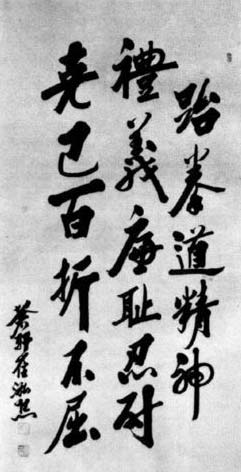
The actual title would be translated as “Taekwondo Spirit” or “The Spirit of Taekwondo.” It was originally written in Korean Hanja (Chinese characters used in Korea for about 1600 years).
General Choi's original calligraphy is shown to the right. Your custom calligraphy will be unique, and not an exact match, as each calligrapher has their own style.In modern times, the common form of written Korean is Hangul (a phonetic character set). The table below shows the text in Hangul and Hanja along with a pronunciation guide and a brief English translation:
| Traditional Korean Hanja | Modern Korean Hangul | Pronunciation | English |
| 跆拳道精神 | 태권도정신 | tae gweon do jeong sin | Taekwondo Spirit |
| 禮儀 | 예의 | ye yi | Courtesy / Etiquette / Propriety / Decorum / Formality |
| 廉耻 | 염치 | yeom ci | Integrity / Sense of Honor |
| 忍耐 | 인내 | in nae | Patience / Perseverance / Endurance |
| 克己 | 극기 | geug gi | Self-Control / Self-Denial / Self-Abnegation |
| 百折不屈 | 백절불굴 | baeg jeor bur gur | Indomitable Spirit (Undaunted even after repeated attacks from the opponent) |
| Note that the pronunciation is the official version now used in South Korea. However, it is different than what you may be used to. For instance, “Taekwon-do” is “tae gweon do.” This new romanization is supposed to be closer to actual Korean pronunciation. | |||
Corinthians 13:4
All you need to know about LOVE
愛是恆久忍耐又有恩慈愛是不嫉妒愛是不自誇不張狂 is 1st Corinthians 13:4 in Chinese.

With large “love” character added.
In English, this reads:
1st Corinthians 13:4 (KJV) Charity suffereth long, and is kind; charity envieth not; charity vaunteth not itself, is not puffed up...
1st Corinthians 13:4 (NIV) Love is patient, love is kind. It does not envy, it does not boast, it is not proud.
1st Corinthians 13:4 (Basic English) Love is never tired of waiting; love is kind; love has no envy; love has no high opinion of itself, love has no pride.
The Chinese translation follows the love meaning, rather than the King James' use of “charity.” I was a little confused when writing this description with the significant differences between the NIV vs. KJV translations. After speaking to a Greek scholar about this, it would seem that the KJV has an almost errant translation with the use of “charity” in place of “love.”
We used the most popular Christian Chinese Bible, which is the Chinese Union Version (CUV). The CUV was first published in 1919. We use this so that the Chinese translation would be as accurate and standard as possible. Any Chinese Christian worth their salt will easily be able to identify this verse when they see these characters.
If you want a big “love” character written above the verse on your artwork, just make a note in the “special instructions” tab when you are customizing your artwork. There is no extra charge for that service on this special verse.
Tang Soo Do Tenets
廉耻精進忍耐遵守克己謙遜百折不屈 are the tenets of Tang Soo Do.
| English | Old Hanja | Modern Hangul | Pronunciation |
| 1. Integrity | 廉耻 | 렴치 or 염치 | yeom ci |
| 2. Concentration | 精進 | 정진 | jeong jin |
| 3. Perseverance | 忍耐 | 인내 | in nae |
| 4. Respect & Obedience | 遵守 | 준수 | jun su |
| 5. Self-Control | 克己 | 극기 | geug gi |
| 6. Humility | 謙遜 | 겸손 | gyeom son |
| 7. Indomitable Spirit | 百折不屈 | 백절불굴 | baeg jeor bur gur |
After some research, it appears this list was compiled in English based on Taekwondo tenets. We filled in a few of the words that did not have a corresponding Hanja or Hangul. If someone else has a better list with characters included, please contact me.
Galatians 5:22-23
Here is Galatians 5:22 and a bit of 23 in Chinese.
The text with punctuation:
圣灵所结的果子,就是仁爱,喜乐,和平,忍耐,恩慈,良善,信实,温柔,节制。
Hand-painted calligraphy does not retain punctuation.
This translation is from the Chinese Union Bible.
You may know it from the KJV as:
5:22 But the fruit of the Spirit is love, joy, peace, longsuffering, gentleness, goodness, faith,
5:23 Meekness, temperance...
1 Corinthians 13:4-8
Here is 1st Corinthians 13:4-8 (just the first sentence of verse 8) in Japanese.
In the familiar NIV, this would read:
Love is patient, love is kind. It does not envy, it does not boast, it is not proud.
It does not dishonor others, it is not self-seeking, it is not easily angered, it keeps no record of wrongs.
Love does not delight in evil but rejoices with the truth.
It always protects, always trusts, always hopes, always perseveres.
Love never fails...
The Japanese text is from the 新改訳聖書 (Shinkaiyaku) or New Japanese Bible. Popular among most Protestant denominations in modern Japan.
Note: Because this selection contains some special Japanese Hiragana characters, it should be written by a Japanese calligrapher.
Not the results for 忍 that you were looking for?
Below are some entries from our dictionary that may match your 忍 search...
| Characters If shown, 2nd row is Simp. Chinese |
Pronunciation Romanization |
Simple Dictionary Definition |
忍 see styles |
rěn ren3 jen nin にん |
More info & calligraphy: Patience / Perseverance(archaism) endurance; forbearance; patience; self-restraint; (given name) Nin kṣānti, 羼提 (or 羼底); patience, endurance, (a) in adverse circumstances, (b) in the religious state. There are groups of two, three, four, five, six, ten, and fourteen, indicating various forms of patience, equanimity, repression, forbearance, endurance, constancy, or "perseverance of the saints," both in mundane and spiritual things. |
堅忍 坚忍 see styles |
jiān rěn jian1 ren3 chien jen kennin けんにん |
More info & calligraphy: Perseverance / Fortitude(n,vs,vt,vi) perseverance |
忍び see styles |
shinobi しのび |
More info & calligraphy: Shinobi / Ninja Outcast |
忍法 see styles |
rěn fǎ ren3 fa3 jen fa ninpou / ninpo にんぽう |
More info & calligraphy: Ninpo(忍法位) The method or stage of patience, the sixth of the seven stages of the Hīnayāna in the attainment of arhatship, or sainthood: also the third of the four roots of goodness. |
忍者 see styles |
rěn zhě ren3 zhe3 jen che ninja にんじゃ |
More info & calligraphy: Ninja(hist) (See 忍術) ninja; person trained in ninjutsu and employed for covert purposes in feudal Japan |
忍耐 see styles |
rěn nài ren3 nai4 jen nai nintai にんたい |
More info & calligraphy: Patience / Perseverance / To Endure / Tolerant(noun, transitive verb) endurance; perseverance; patience forbearance |
忍術 see styles |
ninjutsu にんじゅつ |
More info & calligraphy: Ninjutsu / Ninjitsu |
押忍 see styles |
oshino おしの |
More info & calligraphy: Osu / Affirmative |
忍びの者 see styles |
shinobinomono しのびのもの |
More info & calligraphy: Shinobi No Mono |
三忍 see styles |
sān rěn san1 ren3 san jen sannin |
The tree forms of kṣānti, i.e. patience (or endurance, tolerance). One of the groups is patience under hatred, under physical hardship, and in pursuit of the faith. Another is patience of the blessed in the Pure Land in understanding the truth they hear, patience in obeying the truth, patience in attaining absolute reality; v. 無量壽經. Another is patience in the joy of remembering Amitābha, patience in meditation on his truth, and patience in constant faith in him. Another is the patience of submission, of faith, and of obedience. |
上忍 see styles |
shàng rěn shang4 ren3 shang jen jounin / jonin じょうにん |
Ninja clan master; highest-ranking ninja exceedingly patient |
下忍 see styles |
xià rěn xia4 ren3 hsia jen genin げにん |
low-ranking ninja; (place-name) Shimooshi inferior patience |
不忍 see styles |
bù rěn bu4 ren3 pu jen shinobazu しのばず |
cannot bear to (surname) Shinobazu cannot stand |
中忍 see styles |
zhōng rěn zhong1 ren3 chung jen chuunin / chunin ちゅうにん |
(manga slang) ninja commander middling patience |
二忍 see styles |
èr rěn er4 ren3 erh jen ninin |
The two patiences or endurances: 衆生忍 patience towards all under all circumstances; 無生(法)忍 calm rest, as a bodhisattva、in the assurance of no (re-) birth, i.e. in immortality. Also 安受苦忍 patience under suffering, and 觀察法忍 imperturbable examination of or meditation in the law or of all things. Also, physical and mental patience, or endurance. |
五忍 see styles |
wǔ rěn wu3 ren3 wu jen gonin |
The five stages of bodhisattva-kṣānti, patience or endurance according to the 別教: (1) 伏忍the causes of passion and illusion controlled but not finally cut off, the condition of 十住, 十行, and 十廻向; (2) 信忍 firm belief, i. e. from the 初地 to the 三地; (3) 順忍 patient progress towards the end of all mortality, i. e. 四地 to 六地; (4) 無生忍 patience for full apprehension, of the truth of no rebirth, 七地 to 九地; and (5) 寂滅忍 the patience that leads to complete nirvana, 十地 to 妙覺; cf. 五位. |
伏忍 see styles |
fú rěn fu2 ren3 fu jen buku nin |
The first of the 五忍 five forms of submission, self-control, or patience. |
住忍 see styles |
zhù rěn zhu4 ren3 chu jen jūnin |
dwell in forbearance |
俊忍 see styles |
toshinobu としのぶ |
(given name) Toshinobu |
信忍 see styles |
xìn rěn xin4 ren3 hsin jen shinnin |
Faith-patience, faith-endurance: (1) To abide patiently in the faith and repeat the name of Amitābha. (2) To believe in the Truth and attain the nature of patient faith. (3) According to Tiantai the 別教 meaning is the unperturbed faith of the Bodhisattva (that all dharma is unreal). |
八忍 see styles |
bā rěn ba1 ren3 pa jen hachinin |
The eight kṣānti, or powers of patient endurance, in the desire-realm and the two realms above it, necessary to acquire the full realization of the truth of the Four Axioms, 四諦; these four give rise to the 四法忍, i.e. 苦, 集, 滅, 道法忍, the endurance or patient pursuit that results in their realization. In the realm of form and the formless, they are called the 四類忍. By patient meditation the 見惑 false or perplexed views will cease, and the八智 eight kinds of jñāna or gnosis be acquired; therefore 智 results from忍 and the sixteen, 八忍八智 (or 觀), are called the 十六心, i.e. the sixteen mental conditions during the stage of 見道, when 惑 illusions or perplexities of view are destroyed. Such is the teaching of the 唯識宗. The 八智 are 苦, 集, 滅,道法智 and 苦, etc. 類智. |
六忍 see styles |
liù rěn liu4 ren3 liu jen rokunin |
six kinds of tolerance |
勘忍 see styles |
kannin かんにん |
(noun/participle) (1) patience; patient endurance; forbearance; tolerance; (2) forgiveness; pardon |
十忍 see styles |
shí rěn shi2 ren3 shih jen toshinobu としのぶ |
(personal name) Toshinobu ten tolerances |
受忍 see styles |
junin じゅにん |
(noun, transitive verb) enduring (hardships, inconveniences, etc.); tolerating; accepting |
口忍 see styles |
kǒu rěn kou3 ren3 k`ou jen kou jen kunin |
Patience of the mouth, uttering no rebuke under insult or persecution; there are similarly 身忍 and 意忍. |
可忍 see styles |
ker ěn ker3 en3 ker en kanin |
tolerable |
哲忍 see styles |
tetsunin てつにん |
(given name) Tetsunin |
喜忍 see styles |
xǐ rěn xi3 ren3 hsi jen ki nin |
The 'patience' of joy, achieved on beholding by faith Amitābha and his Pure Land; one of the 三忍. |
四忍 see styles |
sì rěn si4 ren3 ssu jen shi nin |
four kinds of forbearance |
Click here for more 忍 results from our dictionary
The following table may be helpful for those studying Chinese or Japanese...
| Title | Characters | Romaji (Romanized Japanese) | Various forms of Romanized Chinese | |
| Ninja | 忍 | nin | rěn / ren3 / ren | jen |
| Patience Perseverance | 忍 | nin | rěn / ren3 / ren | jen |
| Perseverance Fortitude | 堅忍 坚忍 | ken nin / kennin | jiǎn rěn / jian3 ren3 / jian ren / jianren | chien jen / chienjen |
| Ninja | 忍者 | ninja | rěn zhě / ren3 zhe3 / ren zhe / renzhe | jen che / jenche |
| Ninjutsu Ninjitsu | 忍術 忍术 | ninjutsu | rěn shù / ren3 shu4 / ren shu / renshu | jen shu / jenshu |
| Ninpo | 忍法 | nin pou / ninpou / nin po | rěn fǎ / ren3 fa3 / ren fa / renfa | jen fa / jenfa |
| Osu Affirmative | 押忍 | ossu / osu / osu / osu | ||
| Patience Perseverance To Endure Tolerant | 忍耐 | nin tai / nintai | rěn nài / ren3 nai4 / ren nai / rennai | jen nai / jennai |
| Shinobi Ninja Outcast | 忍び | shino-bi | ||
| Zhen Shan Ren | 真善忍 | zhēn shàn rěn zhen1 shan4 ren3 zhen shan ren zhenshanren | chen shan jen chenshanjen |
|
| Patience Yields Peace of Mind | 能忍自安 | néng rěn zì ān neng2 ren3 zi4 an1 neng ren zi an nengrenzian | neng jen tzu an nengjentzuan |
|
| Shinobi No Mono | 忍びの者 | shinobi no mono shinobinomono | ||
| Bujinkan Ninjitsu | 武神館忍術 武神館忍术 | bu jin kan nin jutsu bujinkanninjutsu | ||
| Osu No Seishin | 押忍の精神 | o su no sei shin osunoseishin | ||
| Perseverance Indomitable Invincible Fortitude | 堅忍不抜 / 堅忍不拔 坚忍不拔 | kenninfubatsu | jiān rěn bù bá jian1 ren3 bu4 ba2 jian ren bu ba jianrenbuba | chien jen pu pa chienjenpupa |
| Korean CKD Virtues | 謙遜正直溫柔忍耐克己不屈 谦逊正直温柔忍耐克己不屈 | qiān xùn zhèng zhí wēn róu rěn nài kè jǐ bù qū qian1 xun4 zheng4 zhi2 wen1 rou2 ren3 nai4 ke4 ji3 bu4 qu1 qian xun zheng zhi wen rou ren nai ke ji bu qu | ch`ien hsün cheng chih wen jou jen nai k`o chi pu ch`ü chien hsün cheng chih wen jou jen nai ko chi pu chü |
|
| Patience Brings Peace of Mind | 忍耐は心の平和をもたらす | nintai wa kokoro no heiwa o motarasu | ||
| Seven Heavenly Virtues | 信仰希望慈善堅忍正義慎重節制 信仰希望慈善坚忍正义慎重节制 | shinkou kibou jizen kennin seigi shinchou sessei shinko kibo jizen kennin seigi shincho sesei | xìn yǎng xī wàng cí shàn jiān rěn zhèng yì shèn zhòng jié zhì xin4 yang3 xi1 wang4 ci2 shan4 jian1 ren3 zheng4 yi4 shen4 zhong4 jie2 zhi4 xin yang xi wang ci shan jian ren zheng yi shen zhong jie zhi | hsin yang hsi wang tz`u shan chien jen cheng i shen chung chieh chih hsin yang hsi wang tzu shan chien jen cheng i shen chung chieh chih |
| Corinthians 13:4 | 愛は忍耐強い。愛は情け深い。ねたまない。愛は自慢せず、高ぶらない。 | ai ha nintai tsuyoi. ai ha nasakebukai. netama nai. ai ha jiman se zu, takabura nai. | ||
| Taekwondo Tenets Spirit of Taekwon-do | 跆拳道精神禮義廉耻忍耐克己百折不屈 跆拳道精神礼义廉耻忍耐克己百折不屈 | tái quán dào jīng shén lǐ yì lián chǐ rěn nài kè jǐ bǎi zhé bù qū tai2 quan2 dao4 jing1 shen2 li3 yi4 lian2 chi3 ren3 nai4 ke4 ji3 bai3 zhe2 bu4 qu1 tai quan dao jing shen li yi lian chi ren nai ke ji bai zhe bu qu | t`ai ch`üan tao ching shen li i lien ch`ih jen nai k`o chi pai che pu ch`ü tai chüan tao ching shen li i lien chih jen nai ko chi pai che pu chü |
|
| Corinthians 13:4 | 愛是恆久忍耐又有恩慈愛是不嫉妒愛是不自誇不張狂 爱是恒久忍耐又有恩慈爱是不嫉妒爱是不自夸不张狂 | ài shì héng jiǔ rěn nài yòu yǒu én cí ài shì bú jì dù ài shì bú zì kuā bù zhāng kuáng ai4 shi4 heng2 jiu3 ren3 nai4 you4 you3 en2 ci2 ai4 shi4 bu2 ji4 du4 ai4 shi4 bu2 zi4 kua1 bu4 zhang1 kuang2 ai shi heng jiu ren nai you you en ci ai shi bu ji du ai shi bu zi kua bu zhang kuang | ai shih heng chiu jen nai yu yu en tz`u ai shih pu chi tu ai shih pu tzu k`ua pu chang k`uang ai shih heng chiu jen nai yu yu en tzu ai shih pu chi tu ai shih pu tzu kua pu chang kuang |
|
| Tang Soo Do Tenets | 廉耻精進忍耐遵守克己謙遜百折不屈 / 廉恥精進忍耐遵守克己謙遜百折不屈 廉耻精进忍耐遵守克己谦逊百折不屈 | lián chǐ jīng jìn rěn nài zūn shǒu kè jǐ qiān xùn bǎi zhé bù qū lian2 chi3 jing1 jin4 ren3 nai4 zun1 shou3 ke4 ji3 qian1 xun4 bai3 zhe2 bu4 qu1 lian chi jing jin ren nai zun shou ke ji qian xun bai zhe bu qu | lien ch`ih ching chin jen nai tsun shou k`o chi ch`ien hsün pai che pu ch`ü lien chih ching chin jen nai tsun shou ko chi chien hsün pai che pu chü |
|
| Galatians 5:22-23 | 聖靈所結的果子就是仁愛喜樂和平忍耐恩慈良善信實溫柔節制 圣灵所结的果子就是仁爱喜乐和平忍耐恩慈良善信实温柔节制 | shèng líng suǒ jié de guǒ zi jiù shì rén ài xǐ lè he píng rěn nài ēn cí liáng shàn xìn shí wēn róu jié zhì sheng4 ling2 suo3 jie2 de guo3 zi jiu4 shi4 ren2 ai4 xi3 le4 he ping2 ren3 nai4 en1 ci2 liang2 shan4 xin4 shi2 wen1 rou2 jie2 zhi4 sheng ling suo jie de guo zi jiu shi ren ai xi le he ping ren nai en ci liang shan xin shi wen rou jie zhi | sheng ling so chieh te kuo tzu chiu shih jen ai hsi le ho p`ing jen nai en tz`u liang shan hsin shih wen jou chieh chih sheng ling so chieh te kuo tzu chiu shih jen ai hsi le ho ping jen nai en tzu liang shan hsin shih wen jou chieh chih |
|
| 1 Corinthians 13:4-8 | 愛は寛容であり愛は親切ですまた人をねたみません愛は自慢せず高慢になりません礼儀に反することをせず自分の利益を求めず怒らず人のした悪を思わず不正を喜ばずに真理を喜びますすべてをがまんしすべてを信じすべてを期待しすべてを耐え忍びます愛は決して絶えることがありません | ai wa kan youdeari ai wa shinsetsudesu mata hito o netamimasen ai wa jiman sezu kouman ni narimasen reigi ni hansuru koto o sezu jibun no rieki o motomezu okorazu hito no shita aku o omowazu fusei o yorokobazu ni shinri o yorokobimasu subete o gaman shi s ai wa kan yodeari ai wa shinsetsudesu mata hito o netamimasen ai wa jiman sezu koman ni narimasen reigi ni hansuru koto o sezu jibun no rieki o motomezu okorazu hito no shita aku o omowazu fusei o yorokobazu ni shinri o yorokobimasu subete o gaman shi s | ||
| In some entries above you will see that characters have different versions above and below a line. In these cases, the characters above the line are Traditional Chinese, while the ones below are Simplified Chinese. | ||||
Successful Chinese Character and Japanese Kanji calligraphy searches within the last few hours...
